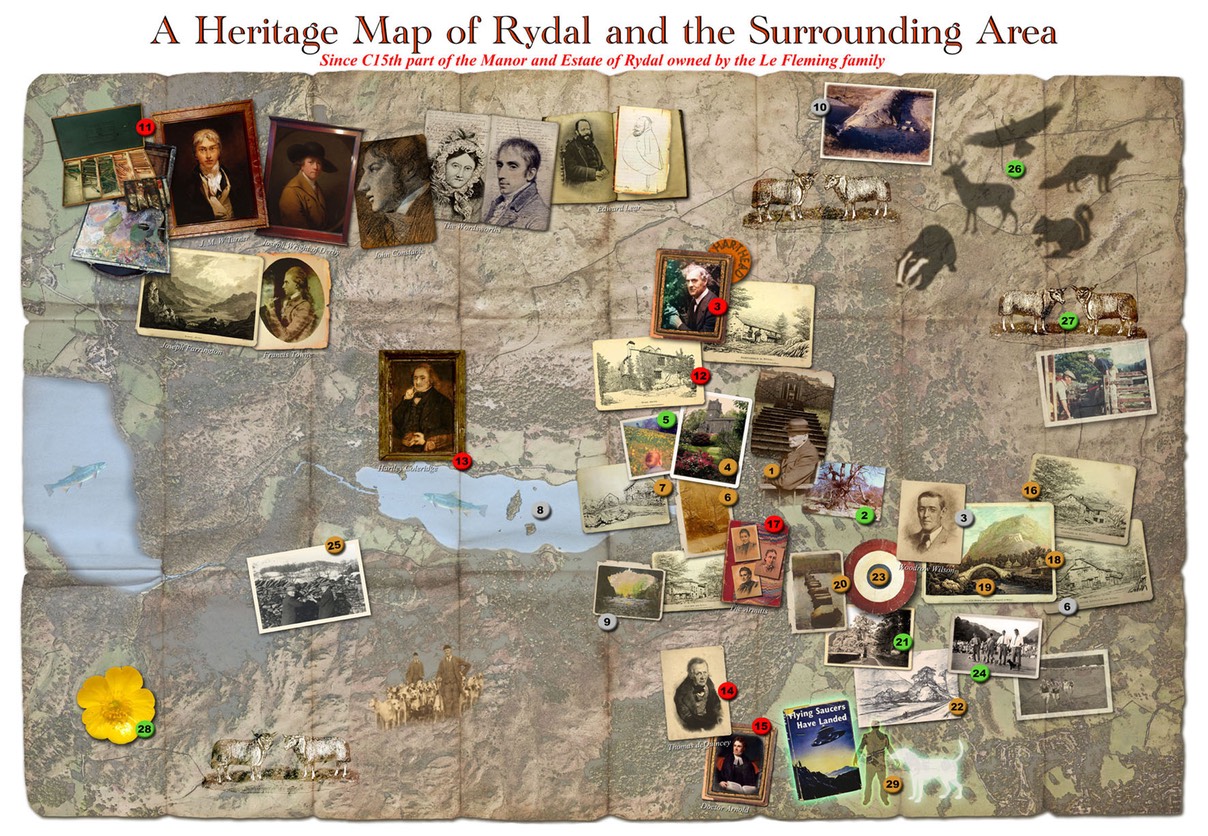Detailed information on items pictured on the map
can be found by following links in the key below.
Key to Colours::
Geology/Lake/Walks. Buildings/Barns/Historic. Artistic and Literary connections.
Wild/Domestic/Animal Life/Rural life/Sports/Flora & Fauna.
1: Rydal Hall: Family seat of the Le Flemings, Lords of the Manor of Rydal from the early 16th century. Now owned by the Diocese of Carlisle.
2: Rydal Park: Has many native & foreign species of trees, among them a 400 year old chestnut.
3: Hart Head Cottage: Home of Fred Yates (1854 - 1919) portrait and landscape painter and a close friend of U.S. President Woodrow Wilson.
4: St. Mary's Church: Built by Lady Le Fleming at a cost of £1,500. Opened on Christmas Day 1824 & consecrated August 26th 1825.
5: Dora’s Field: Land purchased by Wordsworth who originally planned to build a house here. However, following the death of his favourite daughter Dora, he instead planted the daffodils as a permanent memorial to her.
6: Wordsworth Seat: Said to be where Wordsworth sat to seek inspiration (and in order to be observed by passing tourists!)
7: Glen Rothay: Formally an inn known as "David's" until 1809 when it was renovated & became Ivy Cottage. Sub-let in 1822 to Edward Quillinan husband of Dora Wordsworth.
8: Rydal Water: On which are two islands, Heron Island & Little Isle.
9: Rydal Caves: A former quarry providing building stone for nearby houses. White Moss Common was also a quarry.
10: Buckstones Jum: A classic example of a glacial Hanging Valley.
11: Artistic & literary influences: The area has inspired many including J.M.W. Turner, John Constable, Francis Towne, Joseph Wright of Derby, S.T.Coleridge, Edward Lear, John Drinkwater, Fred Yates and many others.
12: Rydal Mount: Home of William Wordsworth from 1812 until his death in 1850.
13: Nab Cottage: Home to the Simpson family whose daughter Margaret married Thomas de Quincey. Later home to Hartley Coleridge 1840-1849.
14: Fox Ghyll: Home of Thomas de Quincey 1820-1825.
15: Fox How: Built at the suggestion of Wordsworth and completed in 1833 for Dr. Arnold of Rugby. The novel “Tom Brown’s Schooldays” (1857) was written by Thomas Hughes, a pupil at Rugby School.
16: Lanty Barn: One of a number of medieval barns still in evidence; Rydal Hall barns & Low Park barn at Rydal Farm date from the 17th century.
17: Manor Cottage: Home to the Armitt sisters Mary Louisa, Anne Maria & Sophia. Mary wrote a history of Rydal & also 'The Church at Grasmere'.
18: Rydal Reading Room: Originally built for local men as a place where they could read the newspapers of the day.
19: Pelter Bridge: Site of an ancient packhorse bridge, the present bridge dates from 1890. Here Fred Yates first met Woodrow Wilson who became the 28th president of the USA from 1913-1921.
20: Stepping Stones: Undated but ancient, these may have been connected to the medieval deer park.
21: The Lord's Oak: An ancient oak which had a 'sister' Ladies Oak on the Under Loughrigg road.
22: Old Hall: Vacated by the Le Flemings in 1576 when it had fallen into a state of disrepair.
23: Target Field: A decree of 1363 obliged all men between the ages of 15 & 60 to practice archery every Sunday & holiday.
24: Ambleside Sports & Sheepdog Trials: Held annually in July & August, a traditional Lakeland sports event including hound trails, fell races & Cumberland & Westmorland wrestling.
25: Irregular boundary stone walls: Many ancient,dating back to the 16th century medieval deer park.
26: Wildlife: Deer, badger, fox, red squirrel plus a great variety of British & migrant birds.
27: Herdwick sheep: This ancient breed graze the surrounding fells.
28: Wildflowers: These are less prolific due to overgrazing by the local sheep.
29: Haunted Rydal: Claims of sightings of a white hound at the site of the Old Hall, a mysterious figure by the Lord's Oak, a white-clad horseman galloping across the Target Field and, in 1965 reports of a flying saucer over Loughrigg.
Acknowledgments: Our thanks to The Lakes Parish Council who sponsored this map.
Researched & Designed by John & Gilly Hodkinson.
